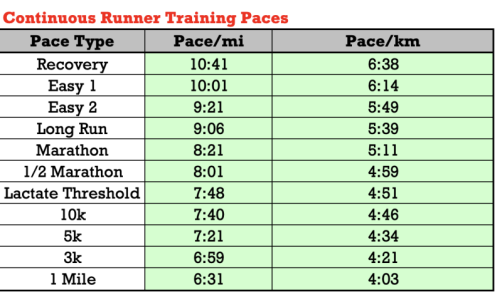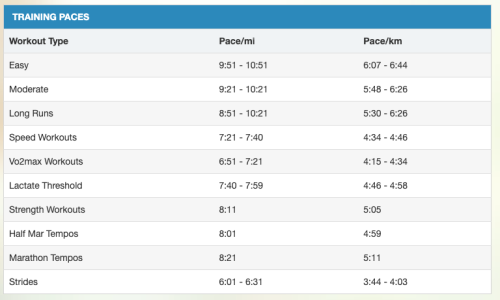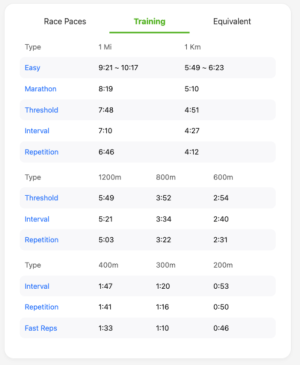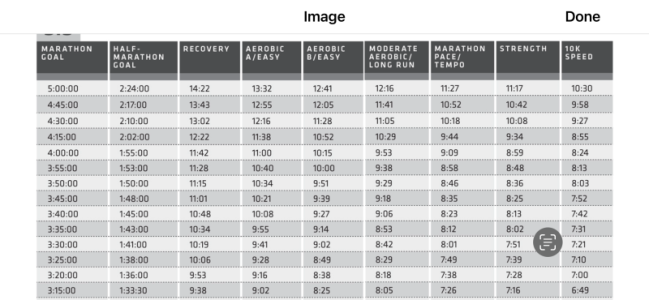With regards to the discussions on tempo runs, Hansons, run slow to go fast, etc., do other people not have these methods/suggestions not work for them? I've seen a big push of articles and videos recently on the "run slow to go fast" advice, but I have never had success with the "slow" pace that these methods suggest. I have tried some of those suggestions in past marathon trainings and they were the worst races I have had. I'm not a super fast runner, my marathon times are about 3:50-3:55 and halfs at 1:45-1:50. So, marathon pace is in the 9min per mile pace, which usually suggests slow pace of 10-11 minutes (the suggestion is sometimes to run 80% of your weekly mileage at that pace). The effort difference of 10-11 minute per mile paces and 9 minute paces over a marathon is pretty large, and as mentioned when I tried to follow this plan, on race day I simply could not sustain the 9 minute pace over the full course distance. It seems to me conditioning yourself with that much mileage at that much slower of a pace doesn't get you ready for the effort level you need on race day. Now, I am not saying I run every single training mile full out, but my "easy days", "slow pace" falls closer to a 9:30 minute mile, and still use speed/tempo days.
I always feel like an oddball when I hear about people on these slow paces, or read articles on the slow, long run advice, as I don't seem to be able to get it to work for me.
I've worked with about 250 people ranging from 2:50 marathon to 7:30 marathon thus far. The vast majority perform better when they train under a methodology of running the majority of their training slow/easy effort and the remainder of the training as specificity for the event. That doesn't mean that the Hansons method, or Daniels method, or Fitzgerald method, or Galloway method, etc. all work for everyone, but that in the general sense the basic tenet of train slow to race fast works for most all. The finer details of each type of methodology then separates gains further. If I had to put a number on it, I'd say it's close to 97-98% of the runners I've worked with fall under this umbrella.
So what about the remaining 2-3% of runners? I would say most of those, but not all, don't ever really buy into the concept. They can't wrap their heads around training slower most of the time, and thus they always continue to creep faster on their paces to the point that they're not doing slow training anymore. And when it comes to race day and they don't see the progress they hoped for, it turns around again on whether they went as slow as they should have.
But what about the tiny sliver of runners remaining after those two above scenarios? The answer is yes. I've seen a small handful of runners that no matter which methodology we use we don't seem to see improvements like I would expect. And when we try to be a little more aggressive on the pacing than I'd like, we start to see some movement in race times. So not impossible that you might be one of these people, but in my experience they're fairly rare.
If you're up for it, I'd love to dive into your data to see what I can find in terms of relationships between your training and race performance. I know from past experience that when I do this type of dive into someone's data in public (instead of in DMs) that some other users have found the information gleaned useful for their own experience. But I know some people prefer privacy/anonymity as well.
Just on the basis of a 1:45 HM time, I would calculate training paces around the following (although this needs to be current fitness and something achieved in the last six months or so):

Hansons says:

Daniels says:

So based on a 1:45 HM current fitness level, the 9:30 average pace you do for easy days sounds about in line with all these. I say 9:20-10:00 (where the average pace you run each week is going to be around 9:20), Hansons says 9:20-10:50, and Daniels says 9:20-10:17.
Marathon time wise, if you ran a marathon when you were in 1:45 HM fitness, then based on real world recreational runner data, I would expect a marathon time with the following probabilities:
6% of runners with a 1:45 HM fitness run a M under similar conditions of a 3:39 or better
10% of runners with a 1:45 HM fitness run a M under similar conditions of a 3:41 or better
25% of runners with a 1:45 HM fitness run a M under similar conditions of a 3:45 or better
50% of runners with a 1:45 HM fitness run a M under similar conditions of a 3:53 or better
You're currently running marathons in the 3:50-3:55 range which would translate to something roughly 47.8-64.8% percentile. Which says to me that based on your 1:45 HM there's still some more juice to squeeze. Those that are good converters from short distances to long distance tend to share the following characteristics in their training plans:
"Conclusions
The conclusions we can draw from this:
-If HM performance is equal, women are likelier to finish with a faster M time than men.
-Runners of all abilities are capable of a 1.06 or less, and roughly the top 10% of all subgroups from 1:20 HM'ers to 2:00 HM'ers were roughly the same R value (or relative performance).
-Faster runners are better converters with a lower R overall average. Makes sense then why Rigel came up with 1.06 since the elite runners available to him would have been a similar pool to the faster runners in Williams dataset.
-Runners on the slower side of the HM performances tend to have more variability as a group because of the bad converters in their groups, not because of the lack of good converters. So more people on the slower side of HM performance training inappropriately for marathon performance.
-Roughly 5:00 to 5:30 hours per week on average for a marathon training plan is considered "typical" or "sufficient" by Williams.
-Those who run more than 5:00-5:30 hours per week are more successful at being good converters than are runners who run less than 5:00-5:30 hours per week.
-Those who do 5L around 100 barely appear different than those around lesser or higher numbers. The 5L would suggest it is lower on the predictive nature than other variables.
-Those who have 5L be a lower % of total mileage from 16 weeks tend to be the best converters. The faster runners also tend to be the ones with lower %5L values. Relying less on the long runs and more balance yields a better relative performance.
-Those who train at 40-80 seconds slower than race pace more often than not will be a good converter and have a R less than 1.15."
Ian Williams: An Updated Race Equivalency Calculator Attempt
If you'd like to go into more detail, answer the following:
1) What are your PRs and when did they occur?
2) What are all your race times that cover the span of time in which PRs occurred or the last 4 years (whichever is longer in time)?
3) Chronologically, what were each of the training plans you've followed and when? And when you did them, did you do them by the book/as written, or did you go off plan with edits?
4) If you can provide the training data either through Strava or Garmin, I can look at different aspects of the training and race pace plans. My preference is Strava because I find it an easier interface to comb other people's data in.




